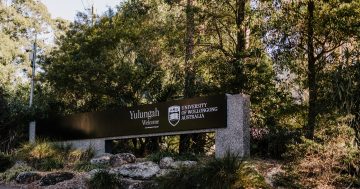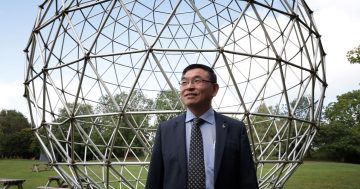
Professor Caleb Ferguson was recently recognised for his world-class research skills and his ability to communicate the findings of it to the broader community. Photo: Supplied.
Tall poppy syndrome. It’s an Aussie phenomenon or societal attitude that refers to the criticism, resentment or exclusion of people based on their success or merit. Those that show or express too much ambition in our culture aren’t celebrated, they’re cut down. Doubtless, it is a type of toxic mindset – that stems from a sense of inferiority and anti-intellectualism – that’s slowly being weeded out.
Professor Caleb Ferguson from the University of Wollongong’s (UOW) School of Nursing knows. He’s a tall poppy. In the world of science, at least.
He has a 2023 NSW Tall Poppy Science Award – that recognises his contribution to stroke and cardiovascular research and his commitment to communicate the intricacies of his findings to the broader community – to prove it.
“I feel very privileged to be recognised in this way,” Professor Ferguson said.
The Australian Institute of Policy and Science kickstarted the annual award to celebrate emerging scientists with elite – and unique – skills like his. It’s a rarity, after all, to find a scientist who can write. Or a writer, for that matter, who can disseminate science. That’s what made him a no-brainer for this year’s top gong.
During this academic’s jam-packed career, he has published more than 120 scholarly works. Some of these have appeared in The Conversation, the world’s leading publisher of research-based news and analysis. Others, in publications from major news outlets.
Not only that, he is the recipient of more than $12m in competitive research funding. His findings are translated into language that’s accessible and shared back to the research participants, the community, and other stakeholders.

Professor Caleb Ferguson is a rising star in the world of science. Photo: Supplied.
“It’s said that it’s not research until it’s published. Yet, the research cycle doesn’t end at publication. It’s only the beginning of science communication, dissemination, and knowledge translation,” Professor Ferguson said.
But that’s not all. For the past decade, this tall poppy has volunteered as a speaker for the Stroke Foundation where he engages with the community and business groups on stroke prevention.
“I promote the FAST (face, arm, speech, time) message for early stroke detection and dispel the myths and misconceptions about stroke prevention and management. It’s a real privilege to be able to connect with local communities in this way,” he said.
Additionally, his post-doctoral research focused on addressing detection, treatment and management of atrial fibrillation, a common cause of stroke. It delved into the educational needs of clinicians and patients through app-based technologies. The study found that educational intervention improved clinician knowledge and stroke risk assessment in acute care.
His ensuing Heart Foundation research fellowship enabled him to partner with consumers and clinicians to co-design and pilot a digital educational program for atrial fibrillation.
According to UOW Vice-Chancellor and President Professor Patricia M Davidson, “He is a rising star in cardiovascular nursing research. His research addresses the growing societal challenge of advanced ageing and frailty. Using technology, he is pioneering new models of care for chronic disease management and transforming care outcomes for older adults.”
If that’s not enough, Professor Ferguson was recently announced as a finalist in the 2023 Health Minister’s Award for Nursing Trailblazers.
Looks like there’s no cutting this tall poppy down.












